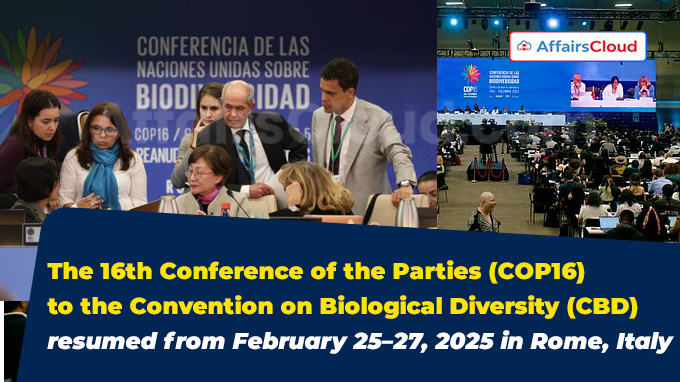 The 16th meeting of the Conference of the Parties (COP16.2) to the Convention on Biological Diversity (CBD) resumed from February 25 to 27, 2025 at the headquarters of Food and Agriculture Organisation (FAO) in Rome, Italy.
The 16th meeting of the Conference of the Parties (COP16.2) to the Convention on Biological Diversity (CBD) resumed from February 25 to 27, 2025 at the headquarters of Food and Agriculture Organisation (FAO) in Rome, Italy.
- Earlier, the COP 16 held in Cali, Columbia in October 2024, which was paused due to lack of quorum required for biodiversity finance related agreements. Later, it was resumed virtually in December 2024 but again it was ended abruptly.
- Susana Muhamad, the COP16 President from Colombia, stressed the need for urgent action and highlighted that ambitious plans require adequate funding to succeed.
Note: Armenia will host the 17th COP (COP17) to the CBD in 2026.
Background:
i.CBD is an international treaty, established in 1992, for the conservation of biodiversity , the sustainable use of components of biodiversity, and equitable sharing of the benefits from the use of genetic resources.
- At present, CBD has 196 member countries including India.
ii.Kunming-Montreal Global Biodiversity Framework (KMGBF) was established during COP15 held in Montreal, Canada in 2022, managed by the Global Environment Facility (GEF).
- Currently, it is operational and received initial funding from Austria, Canada, Denmark, France, Germany, among others, which amounted to nearly USD 382 million.
Key Highlights of COP16.2 CBD:
Biodiversity Funding Agreement:
During the conference, member countries adopted a landmark biodiversity funding agreement, aimed at establishing a long-term financial mechanism to protect biodiversity and ensure the success of the KMGBF.
- The agreement focuses on two primary objectives such as: bridging the biodiversity finance gap from all sources (public, private and international) and implementing article 21 of the CBD, to establish permanent financial mechanisms under the authority of the COP, ensuring sustained long-term funding for biodiversity protection.
Key Points:
i.Resource Mobilisation: The governments pledged to mobilise USD 200 billion annually by 2030 from all sources to support biodiversity initiatives across the world, including the mobilization of minimum USD 20 billion annually in Official Development Assistance (ODA) by 2025 and USD 30 billion annually by 2030, in line with target 19 of the KMGBF.
- So far, the GEF has allocated over USD 3 billion in support of biodiversity goals, generating an additional USD 22 billion, including USD 1.9 billion from the private sector.
ii.Financial Mechanism: During the conference, members countries agreed on adopting the financial mechanism of the convention which focuses on the GEF and the Global Biodiversity Framework Fund (GBFF).
- Also, the COP adopted the 4-year framework of biodiversity programme priorities of the CBD and its protocols to inform about next GEF replenishment (2026-2030).
iii.Monitoring framework for the KMGBF: The COP agreed to provide a set of indicators for monitoring the progress towards the goal and targets of the KMGBF in the 7th and 8th national reports.
- One of the key additions to the monitoring framework is an indicator for target 22 i.e. on land use change and land tenure in the conventional territories of Indigenous Peoples and local communities.
Cali Fund Launched to Boost Biodiversity Finance:
The key outcome of the resumed CBD COP16 was the launch of a new international fund, ‘Cali Fund’, aimed to help protect biodiversity as well as boost the biodiversity funds.
- It is designed for fair and equitable sharing of benefits from the use of Digital Sequence Information (DSI) on genetic resources.
- Initially, the fund was adopted on November 2, 2024 at COP16 CBD held in Cali.
About Cali Fund:
i.The fund will receive financial support from companies who use genetic data from nature in their businesses.
ii.Also, the financial contributions to the Cali fund will be used for the implementation of the CBD, including supporting the implementation of the KMGBF.
iii.Minimum 50% of the Cali fund will be allocated to the indigenous people and local communities recognizing their pivotal role in protecting nature.
iv.The fund will be administered by the Multi-Partner Trust Fund Office (MPTFO) in collaboration with the United Nations Development Programme (UNDP) and the United Nations Environment Programme (UNEP).
- Also, the Secretariat of the CBD will host the Cali Fund Secretariat.
v.The disbursements of fund will be used to boost the implementation of KMGBF, the universal plan to stop and reverse biodiversity loss by 2030 adopted under CBD.
Agri-NBSAPs Support Initiative:
The FAO urged for bold action to transform the Agrifood Systems (AFS) in support of global biodiversity targets during the COP16.2 of CBD which saw the participation of representatives from more than 150 countries.
- The event built on momentum from COP16 held in October 2024, where, FAO, the Government of Columbia and the CBD secretariat launched the ‘Agri-NBSAPs Support Initiative’.
- While addressing the conference, Qu Dongyu, Director-General (DG) of FAO emphasized on adopting integrated approach across government sectors, to ensure 4 betters: better production, better nutrition, better environment, and a better life-leaving no one behind.
About Agri-NBSAPs:
i.The initiative helps the governments integrate AFS into their National Biodiversity Strategies and Action Plans (NBSAPs) and implementation efforts.
- The initiative will be implemented for a period of 5 years i.e. from 2025 to 2030, covering the 7th and 8th phases of national reporting and the timeline for implementation of KMGBF.
ii.Under this initiative, 15 countries will be selected based on criteria such as their alignment with the FAO’s Country Programming Framework (CPF) and their request for support in implementing the KMGBF.
iii.The initiative will provide targeted support to the governments in their efforts in identifying and implementing actions in AFS that will enable them to achieve biodiversity goals specified in their NBSAPs.
- This targeted support includes: institutional capacity, policy coherence, stakeholder participation, knowledge generation and access to finance.
About Food and Agriculture Organisation (FAO):
It is of the specialized agencies of United Nations (UN), to make international efforts to combat hunger and to achieve food security for all.
Director-General (DG)- Qu Dongyu
Headquarters- Rome, Italy
Established- 1945




